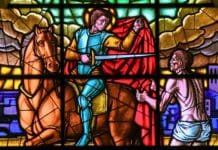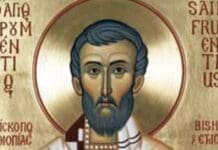 Like many of the most ancient Christian feasts, Epiphany was first celebrated in the East, where it has been held from the beginning almost universally on January 6. Today, among both Eastern Catholics and Eastern Orthodox, the feast is known as Theophany—the revelation of God to man. In the United States it is celebrated on the Sunday between January 1 and January 6. (in 2011 on January 2)
Like many of the most ancient Christian feasts, Epiphany was first celebrated in the East, where it has been held from the beginning almost universally on January 6. Today, among both Eastern Catholics and Eastern Orthodox, the feast is known as Theophany—the revelation of God to man. In the United States it is celebrated on the Sunday between January 1 and January 6. (in 2011 on January 2)
Epiphany originally celebrated four different events, in the following order of importance: the Baptism of Christ; Christ’s first miracle, the changing of water into wine at the wedding in Cana; the Nativity of Christ; and the visitation of the Wise Men or Magi. Each of these is a revelation of God to man: At Christ’s Baptism, the Holy Spirit descends and the voice of God the Father is heard, declaring that Jesus is His Son; at the wedding in Cana, the miracle reveals Christ’s divinity; at the Nativity, the angels bear witness to Christ, and the shepherds, representing the people of Israel, bow down before Him; and at the visitation of the Magi, Christ’s divinity is revealed to the Gentiles—the other nations of the earth.
Eventually, the celebration of the Nativity was separated out, in the West, into Christmas; and shortly thereafter, Western Christians adopted the Eastern feast of the Epiphany, still celebrating the Baptism, the first miracle, and the visit from the Wise Men. Thus, Epiphany came to mark the end of Christmastide—the twelve days of Christmas, which began with the revelation of Christ to Israel in His Birth and ended with the revelation of Christ to the Gentiles at Epiphany.
Over the centuries, the various celebrations were further separated in the West, and now the Baptism of the Lord is celebrated on the Sunday after January 6, and the wedding at Cana is commemorated on the Sunday after the Baptism of the Lord.
In many parts of Europe, the celebration of Epiphany is at least as important as the celebration of Christmas. In Italy and other Mediterranean countries, Christians exchange gifts on Epiphany—the day on which the Wise Men brought their gifts to the Christ Child—while in Northern Europe, it’s not unusual to give gifts on both Christmas and Epiphany (often with smaller gifts on each of the twelve days of Christmas in between).
















